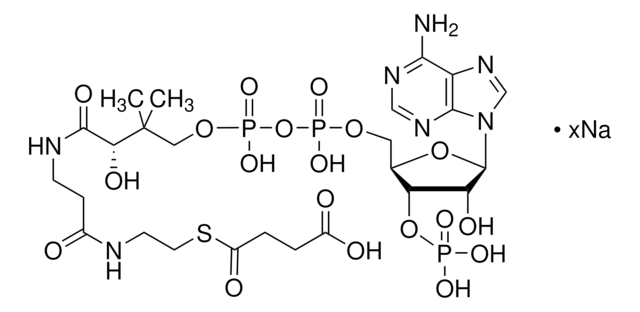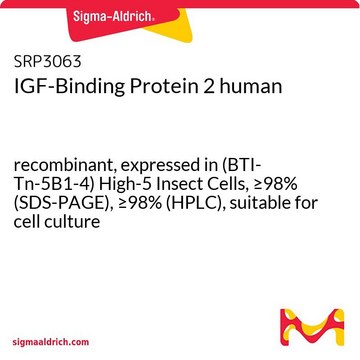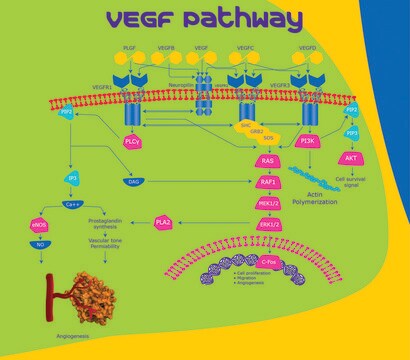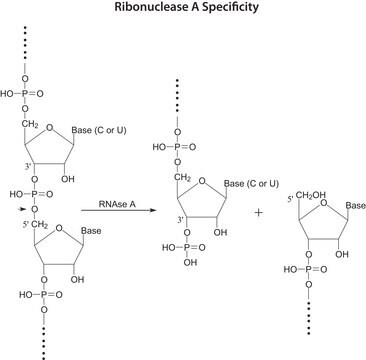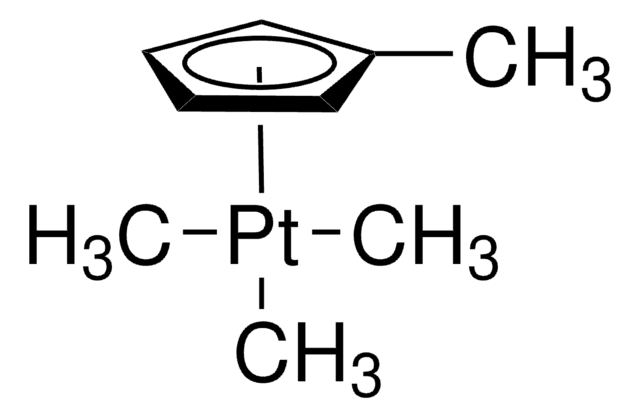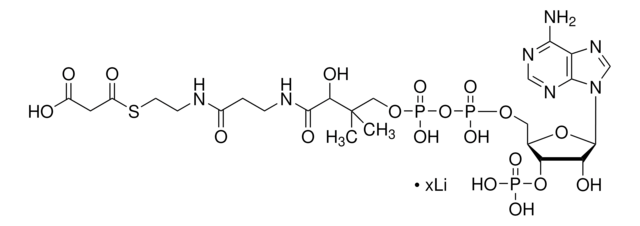A6955
Angiogenin human
≥97% (SDS-PAGE), recombinant, expressed in E. coli, lyophilized powder, suitable for cell culture
Synonym(s):
ANG
Sign Into View Organizational & Contract Pricing
All Photos(1)
About This Item
Recommended Products
biological source
human
Quality Level
recombinant
expressed in E. coli
Assay
≥97% (SDS-PAGE)
form
lyophilized powder
mol wt
14.4 kDa
packaging
pkg of 50 μg
storage condition
avoid repeated freeze/thaw cycles
technique(s)
cell culture | mammalian: suitable
impurities
endotoxin, tested
UniProt accession no.
storage temp.
−20°C
Gene Information
human ... ANG(283)
General description
Angiogenin is a secreted growth factor. It is localized in the tissue fluids such as plasma, amniotic fluid, cerebrospinal fluid and tumor microenvironment.
Application
Angiogenin human has been used to treat chicken eggs to determine its activity by chorioallantoic membrane (CAM) analysis . It has also been used to determine the angiogenic activity of Candida albicans and Streptococcus pneumoniae cultures by chicken chorioallantoic membrane assay .
Biochem/physiol Actions
Angiogenin plays a role in several biological functions such as tumorigenesis, innate immunity, neuroprotection. It also plays a role in reproduction, regeneration of damaged tissues and neovascularization.
Angiogenin, a liver-derived angiogenic factor, is a single chain polypeptide with an isoelectric point of pl >9.5 and a member of the ribonuclease superfamily.
Angiogenin, a liver-derived angiogenic factor, is a single chain polypeptide with an isoelectric point of pl >9.5 and a member of the ribonuclease superfamily. Although the ribonucleolytic activity of angiogenin toward most RNase A substrates is lower than that of RNase A, this activity is essential to its angiogenic activity since inhibition of the angiogenin RNase activity will inhibit the angiogenic activity. High affinity receptors for angiogenin are expressed in cultured aortic smooth muscle cells and can be modulated by protamin, heparin and placental ribonuclease inhibitor.
Physical form
Lyophilized from a 0.2 μm filtered solution in phosphate buffered saline containing 2.5 mg bovine serum albumin.
Analysis Note
The activity of human angiogenin is tested in culture by measuring its ribonucleolytic activity for yeast tRNA.
Storage Class Code
11 - Combustible Solids
WGK
WGK 3
Flash Point(F)
Not applicable
Flash Point(C)
Not applicable
Personal Protective Equipment
dust mask type N95 (US), Eyeshields, Gloves
Choose from one of the most recent versions:
Already Own This Product?
Find documentation for the products that you have recently purchased in the Document Library.
J Badet
Pathologie-biologie, 47(4), 345-351 (1999-06-18)
Angiogenin is a heparin-binding 14 kDa plasma protein with angiogenic and ribonucleolytic activity. Although its structural features have been extensively studied, an understanding of its physiological role and of how its properties are expressed continues to elude researchers. This article
D J Strydom
Cellular and molecular life sciences : CMLS, 54(8), 811-824 (1998-10-07)
The angiogenic and other biological functions of the angiogenins, members of the pancreatic RNase superfamily of proteins, are reviewed in the context of their primary and tertiary structures. The ribonucleolytic activity and interactions with the placental ribonuclease inhibitor have seen
Human angiogenin lacks specific antimicrobial activity
Avdeeva, Svetlana V, et al.
Current Microbiology, 53(6), 477-478 (2006)
E Hatzi et al.
European journal of biochemistry, 260(3), 825-832 (1999-04-02)
Human angiogenin is a plasma protein with angiogenic and ribonucleolytic activities. Angiogenin inhibited both DNA replication and proliferation of aortic smooth muscle cells. Binding of 125I-angiogenin to bovine aortic smooth muscle cells at 4 degrees C was specific, saturable, reversible
Our team of scientists has experience in all areas of research including Life Science, Material Science, Chemical Synthesis, Chromatography, Analytical and many others.
Contact Technical Service
